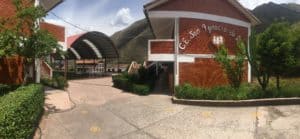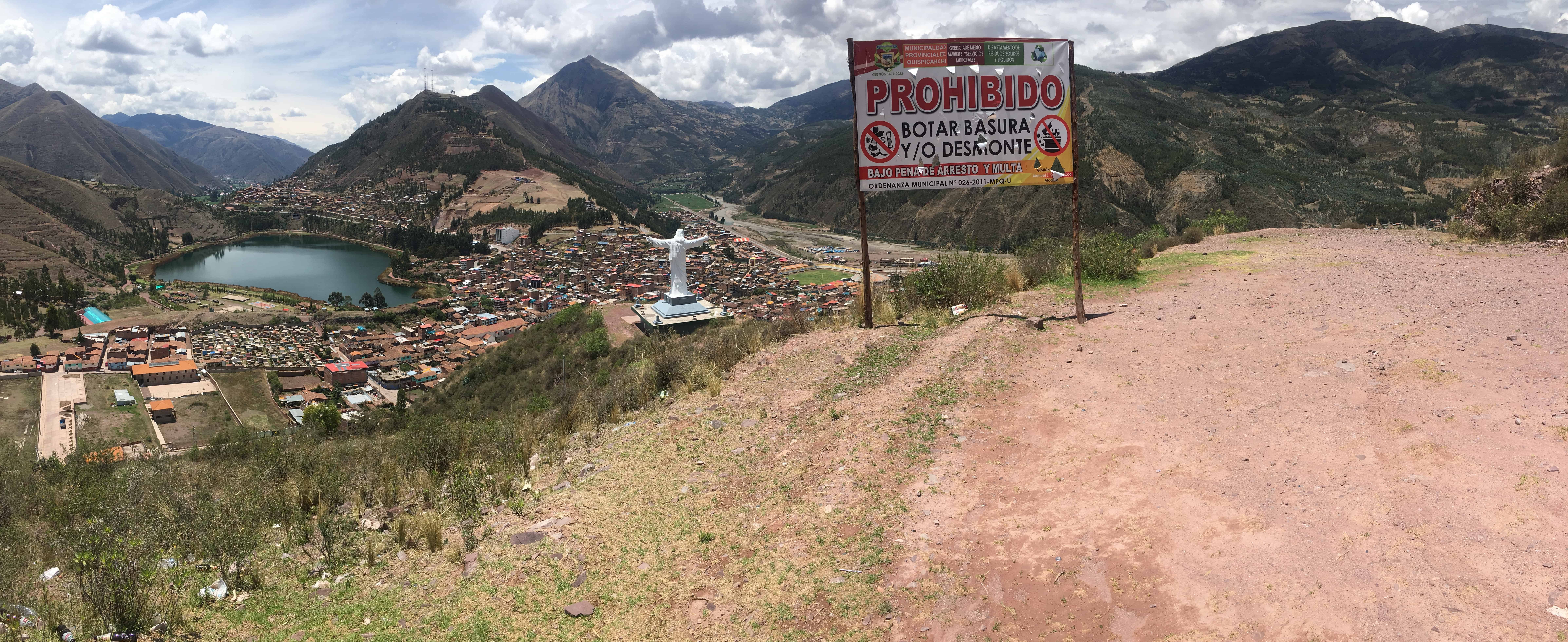The following reflection is part of our “Jesuit 101” series, celebrating the Ignatian Year. This piece helps us to dive deeper into the Contemplation on the Incarnation from the Spiritual Exercises. To learn more about this contemplation, check out our explainer article: “Jesuit 101: The Contemplation on the Incarnation: Why and How Jesus Shows Up”
“Me escuchas?” “Can you hear me?” During Advent, I like to listen to the popular song, “Do You Hear What I Hear?” “Can you hear me?” is also one of the phrases I use most often while I am teaching online classes at Colegio Fe y Alegría 44 in Andahuaylillas about an hour away from Cusco, Perú. Most of the high school classes are still virtual. To make it worse, none of the students have their cameras turned on, so I feel as if I am talking into outer space where no one can hear me.
I felt this way before when I was sent out as a Jesuit novice for 30 days with $35, a one-way bus ticket, and no phone – an experience called the pilgrimage. I walked into a homeless shelter and asked for a bed. “We’re full.” My face dropped in disappointment and my heart sank into my stomach. I had no idea what to do or where to go. I wandered the town in a mixture of confusion, dismay, and fluster. I asked out loud, not sure if anyone could hear me or was listening: “What should I do, God? You have been with me up to this point, but where are you now? Why did you leave me at the final hour?” It’s similar to how I feel now when hardly any of my virtual students respond back. God did hear me that night on my pilgrimage. In the morning as I was walking out of the park, someone who had slept not far from me asked, “Morning, how’d you sleep?” It was the simplest of questions, but it meant the world to me. Yes, the God of care and comfort had heard me and was always with me – despite all my doubts.
“Can you hear me?” also harkens back to an 8-day silent retreat I made as a novice. My retreat director gave me an excerpt from The Sign and the Sacrifice by Rowan Williams. Before reading it, I had always thought of Jesus’ Incarnation from the perspective of the Trinity who “decided” to save humankind because we are sinners. Although that is not entirely wrong, upon reading it, I finally saw it from our human perspective: we beg God to comfort us in our sorrows. I naively thought that God was only focused on our salvation rather than on comforting us as well. Williams writes the following, illustrating how God hears and responds to our pleas:
‘Did you hear what I just said?…I can bear it now, because – because of you…Though why should it be – why you must break your heart to comfort mine…’ Gilles looks at her, ‘the old speculative gleam kindling in his eyes’, and says, ‘I wonder. Is that what men have asked of God?’” 1
Humanity begged God to comfort our broken hearts, as if we were saying, “If you loved us, God, then you would respond to our groanings and not be so distant, a virtual class with no camera on!” God heard our plea – ultimately deciding to send Jesus to walk with us.
St. Ignatius invites us to this kind of pleading before God in the contemplation on the Incarnation from the Spiritual Exercises: “hear the Divine Persons saying, ‘Let us work the redemption of the whole human race; let us respond to the groaning of all creation.’” 2 God is not a distant God at all – on the contrary! Praying over this imaginative meditation, I pictured God saying with conviction, “Yes, I want to comfort my daughters and sons…even if it will break my heart to the point of costing me my life.”
How can we imagine the triune God “looking upon our world” now?
I see it on two levels, both the personal as well as the cosmic. While in Urcos, Perú, where I live in the Jesuit community, it has been quite easy to imagine how God sees our world. The first thing you notice when you drive into Urcos is a statue that the locals call Cristo blanco (“white Christ”). Jesus stands with arms outstretched, as if trying to embrace all that Urcos contains. In the words of Ignatius, he embraces “some getting married and others getting divorced, the old and the young, the rich and the poor, the happy and the sad.” God chose to embrace all of our current social injustices, including poverty, discrimination, inequality in health care, and climate change.
The embrace of that last one has an added dimension for me. Not far from Cristo blanco is a sign put up by the municipality stating, “It is forbidden to throw garbage under penalty of arrest and fine.” At first, I was so impressed since I rarely see a sign like that in the Midwest. The closer I looked, though, I noticed all the plastic bottles and other trash scattered around the sign and statue. The sign is a signal of hope that the plea to care for the environment is being heard, even if slowly. Still, the problem in Peru is much more complex and cosmic than the littering of Inca Kola bottles.
While my Jesuit community was watching the evening news a few weeks ago, there was a story about a protest in a copper mine operated by Antamina, Perú’s largest copper producer. The rural Aquia community say the company has never fully paid Aquia for the lands it uses, an allegation Antamina has disputed in the past. Unfortunately, this story is not new, for Perú knows the reality of climate change all too well given the prevalence of illegal mining among other issues. 3 Pachamama (Quechua 4 for “Mother Earth”) cries out for help. Despite the immensity of the problem, students at our school are responding, incorporating daily habits that are eco-friendly and understanding that the people on the margins of society are at greater risk from climate change.

Colegio Fe y Alegría 44, which has been empty for most of the pandemic.
Advent is a season of waiting, and we are all living in a season of waiting within a waiting: waiting for the end of the Covid-19 pandemic. Jesus has been listening to my desire to return to in-person classes. Just two week ago, many students returned to in-person classes and I have yet to ask, “Me escuchas?” in person. Jesus was inviting me to grow in patience and trust that I was being listened to, even if I thought I was talking to outer space. As we continue to wait for the coming of the Christ Child this Advent, let us ask God: What ways do we need to open our ears and hearts in order to listen to the groanings that Jesus hears? We may not directly “hear” anything in response, nor may it be on our “timeline.” However, the Divine Persons listen and respond to our pleas by breaking their heart to comfort ours. Which people in our day-to-day lives break their hearts in order to give us the hope that, “The Child, the Child, sleeping in the night, he will bring us goodness and light”?
-//-
Photos courtesy of the author.
- Williams, Rowan. The Sign and the Sacrifice: The Meaning of the Cross and Resurrection. Westminster John Knox Press, 2017. ↩
- David L. Fleming, SJ, Draw Me Into Your Friendship: A Literal Translation and a Contemporary Reading of the Spiritual Exercises, St. Louis: Institute of Jesuit Sources, 1996, 91 and 93. ↩
- Catholic Relief Service, “The Pull of Peru’s Gold Rush” ↩
- The indigenous language here in the Andes Mountains and of the Inca Empire which built Machu Picchu ↩


